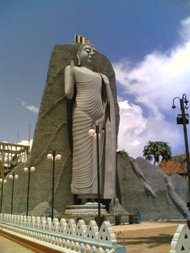Is the climate changing in Sri Lanka?
 By Dhanesh
By Dhanesh
Wisumperuma
www.Nation.lk-----------
Climate change is among the major issues discussed in today’s world. Though it was not a key topic a year ago, it grabbed the
world’s attention during the year 2007. The facts revealed by the fourth assessment report published during the last year changed the attitude of the people. Their own experience of the changes taking place all over the world also contributed towards this change. Climate change, its impacts, adaptation, mitigation and climate politics are among the favoured themes now.
In the Sri Lankan scenario, climate change will have an impact on a number of fields, which could eventually devastate the agriculture, economy, environment etc. Researches have repeatedly pointed out that tropical region will experience the worst impacts of the changing climate. Sri Lanka is an island surrounded by the Indian Ocean and this will expose us to the direct effects of climate change. Hence, a discussion of these potential impacts will provide an idea of the future challenges of the country.
Global warming resulting from the greenhouse effect is the key process for the climate change. In other words, temperature increase is the cause for the climate change. During 1850 and the period between 2001-2005, global average temperature has increased from about 0.76° C. Researches conducted in Sri Lanka have revealed that the average temperature is increasing in a number of areas of Sri Lanka. These include areas such as Nuwara Eliya, Anuradhapura, Maha Illuppallama, Hambantota and Angunakolapelessa. Interestingly, most of this research has shown there are other factors, which have an impact of the warming trend. It is predicted that the average increase of temperature during this century will be between 1.8–4.0 ° C.
A change in the rainfall pattern is evident in Sri Lanka. It has shown that rainfall is decreasing in some areas in general. Some researches have shown that there is an increase of rainfall in the wet zone of Sri Lanka and a decrease in the dry and intermediate zones. This will have an effect on a number of sectors such as the biodiversity, agriculture as well as to an increase of natural disasters. Further to that, global research has shown that climate change could be behind the unpredictable weather patterns. We too experienced untimely rains all over the island a few weeks ago, where the rains and flash floods hampered the harvesting of Maha paddy cultivation.
Sea level rise is among one of the widely spoken impacts of climate change. Global average sea level rise in the 20th century is 17 cm. It is predicted that the sea level could rise by about 18 to 59 cm within the 21st century. However, there is an argument that the real sea level rise could be more than that, as the melting ice in Greenland and other similar areas were not fully considered in the previous calculations. The extreme end of these predictions is a sea level rise of about 7 to 10 metres, but it is expected to take centuries or millennia to this increase. This melting will also depend on the success of the efforts to reduce green house gas emissions. Such a sea level rise will have devastating impacts on countries like Sri Lanka.
A World Bank working paper pointed in 2005 that, Sri Lanka would experience the highest impact of a 1-metre sea level rise in South Asia when we consider the impact on urban areas. Human dwellings, roads and rail tracks and also tourism infrastructure could be hit by the rising sea levels.
All above are some of the key issues related to the changing climate in Sri Lanka. It is important to find what would be the impact of above changes in other sectors. Rainfall fluctuations and increase of temperature could reduce the productivity of paddy and vegetable production. Research has shown that the rising temperatures could have an impact on the tea production in low country and also on coconut plantation. Early research based on climate models has predicted a shift of distribution of forest types, an increase of dry forests and a decrease in rain forests. The rising sea level could increase the sea erosion, which is already a serious issue and threaten coral reefs. This could threaten the unique mangrove ecosystems where the landward expansion is limited by the coastal developments such as shrimp farms, buildings and natural barriers. A rise in sea level could also result in a salinity increase on coastal soils and inland waters, which could threaten vegetation and specially the paddy cultivation in the coastal areas.
Where we are
Based on the impacts both already evident and predicted, it is obvious that we should take further action to research and also on adaptation measures for the impacts of climate change. Sri Lanka has signed both the United Nations Framework Convention on Climate Change (UNFCCC) and the Kyoto Protocol, the two global efforts to combat climate change. Various parties have undertaken a number of researches of the impacts of climate change as well as adaptation measures since early 1990s. The outcome of these studies support some of the above-mentioned impacts.
However, there is a need to increase the researches carried out on climate change and its impact of the country. There are some sectors where less research is conducted and where further studies are required for better clarifications. According to our observations, it appears that there are very few research studies related on climate change undertaken at present. In fact, there were very few research papers related to climate change presented in recent research symposiums in Sri Lanka.
However, it seems that the country has taken steps in the correct direction recently. We saw that the challenge of climate change was highlighted by the President of the country in international meetings and also by the Minister of Environment and Natural Resources. The most recent initiative, the launch of the Climate Change Secretariat (CCS) and the Sri Lanka Carbon Fund appears to be a step forward, though it was to be done years before.
According to the available information, the secretariat is designated to function as the institutional mechanism tasked with responding to climate change, including the development of relevant policies and programmes. It will be the repository of all climate change related information. It is important to note that the Secretariat will be the designated national authority for Clean Development Mechanism projects. The objective of the Carbon fund is to provide technical and financial assistance to the CDM project developers in various areas. This is also important as Sri Lanka lags in this area while other developing nations are way ahead of us.
There is one important fact significant to be reminded here. There was an institution which was initiated to fulfil at least a few similar objectives of this secretariat. That was the Centre for Climate Change Studies established in 2000, as a part of the Department of Meteorology by a Cabinet Memorandum dated June 11, 1999 to address issues related to Climate Change. It was housed at the Department of Meteorology and often mentioned as a division of that department. That centre was more dedicated for research and information dissemination activities. There were some important researches carried out through that centre and some of these researches were presented in academic symposiums subsequently. However, apart from the few web pages available online as at 13/05/2008 (www.meteo.slt.lk/cccc.html), a few publications of this centre seem to be inactive since 2003. The web site appears to be not updated since 2003.
We hope that the new secretariat will be a successful initiative. However, the challenge is not to initiate institutions, but to continue the important work initiated with productive results.
****





















































No comments:
Post a Comment